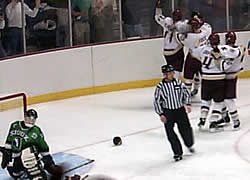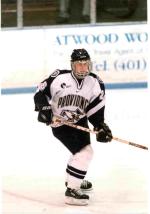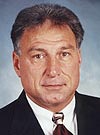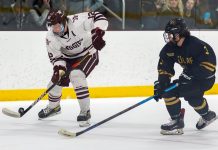— New Hampshire coach Dick Umile
— Northeastern coach Bruce Crowder
In recent seasons it’s been difficult to handicap the race for the Hockey East crown. A year ago, the First to Fourth Lottery pointed to a clear path to playoff home ice for Boston College, Boston University, Maine and New Hampshire. Instead, BU stumbled to a sixth-place finish while Providence crashed the party of the league elites and tied for second place.

The season before that BC appeared to have the dominant talent to finish first and BU, coming off a down year, seemed primed for an even bigger crash after the graduation of Michel Larocque. Instead, BC’s regular-season inconsistencies held the Eagles to a third-place finish while BU surprised everyone by rebounding to take the Hockey East crown.
Even when the projections look easy, they’re frequently wrong or, at best, half-right.
A definite no-brainer, however, loomed for this year’s pick as regular-season champion. At least it looked that way back in April. The Boston College Eagles had dominated the 2000-2001 Hockey East race and gotten the 2000-pound gorilla off their backs when they won the national championship. Despite graduating a terrific senior class led by Brian Gionta, Bobby Allen and Scott Clemmensen, BC still returned exceptional talent led by a sophomore class that had been the envy of all recruiters last year.
During the offseason, however, all that changed. The Eagles crashed back to the rest of the pack when Krys Kolanos, Chuck Kobasew and Brooks Orpik all turned pro or left for juniors with eligibility remaining.
Now it’s as wide-open of a race as ever. Like last year, four different teams received first-place votes in the preseason coaches’ poll. Unlike any poll in memory, however, a fifth team — Providence — received the most total votes and therefore was projected to finish first… even though not a single coach picked the Friars to finish first. If that bizarre twist doesn’t underline the wide-open field this year, perhaps nothing can.
Even the five “favorites” have major questions. Many include that make-or-break position, goaltender, where the league as a whole lacks the dominant presence it has typically had in a Ty Conklin, Ricky DiPietro, Michel Larocque or Marc Robitaille. Questions exist even for Hockey East’s top two netminders, Nolan Schaefer (Providence) and Matt Yeats (Maine).
While the wide-open race should result in plenty of fan excitement and an even closer gap from top of the standings to bottom, that parity could also mean that no Hockey East teams will be dominant on the national stage. Unless one or two emerge, the league may not have its accustomed position in the polls or, potentially, in the NCAA tournament.
Of course, there’s a lot of hockey to be played between now and then, so let’s take a quick look at the nine teams, in order of predicted finish, with links provided for more detailed analysis. Click on any team’s name for its individual season preview page.
1. Providence

During the 1976 presidential race, Eugene McCarthy took a vicious swipe at Walter Mondale, saying that his fellow Minnesotan had “the soul of a vice president.” With no malice intended, the comparable question may be asked of the Friars. Will they be comfortable finishing a close second or will they have the fire to claim their first regular season Hockey East title?
The talent appears to be there. On paper, Providence can boast what should be the top offensive club in the league — perhaps by a wide margin — as well as its number-one goaltender, All-American Nolan Schaefer. Schaefer, however, was anything but spectacular over the second half last year. Will he return to his first-half form? And can PC replace defensive stalwarts Matt Libby and Jay Leach?
2. Maine
How will the Black Bears respond to the death of their beloved coach? Will the team find itself adrift without its heart and soul? Or will it draw on the memories of Shawn Walsh and play with the enthusiasm and competitive fire that he embodied?
Maine has the league’s best one-two tandem between the pipes and a deep offense, albeit one without a proven star. There are plenty of candidates for stardom up front, though, so the Black Bears could once again be filling the net early and often. The question lies with a thin defense that could have really used the return of Doug Janik.
Arguably, Ty Conklin meant more to his team last year than any other player in the league. Can either of his backups rise to the challenge of replacing Mr. Irreplaceable? There will be new faces on the blue line, too, which could combine with the new face in the nets to cause problems.
It would be an upset of epic proportions if UNH once again broke the Hockey East record for least goals against like it did last year. However, a strong recruiting class and the return of most of its offense should spell a much more potent attack and playoff home ice, if not more.
Other than losing Brian Gionta, Bobby Allen, Scott Clemmensen, Krys Kolanos, Chuck Kobasew, Brooks Orpik, Rob Scuderi, Mike Lephart, Marty Hughes and Mark McLennan, there aren’t any questions for the Eagles this year. In case you wondered, those losses included 117 goals, 281 points and one of the top goaltenders in the league. To put that in perspective, those 117 goals exceed last season’s total of five entire Hockey East teams.
As a result, there will be questions in the net, on defense and up front for Boston College. The Eagles ran away from the rest of the league last year in terms of production from their freshman class. They’ll need a similar performance in the months to come to challenge for first place.
Last year, the Terriers never really recovered from the departure of goaltender Ricky DiPietro to the pro ranks. Inconsistent goaltending, sub-par performances on the blue line and a dearth of scoring combined for a sixth-place finish. Can the defense rebound? Will Sean Fields or Jason Tapp rise to the occasion in the BU nets? Who will carry the offensive load?
Although questions abound, the Terriers could make a run for the title. Their defense should rank among the league’s best from one to six on the depth chart. A stellar incoming class could give the team the same boost it received two years ago. And Fields could be poised for a breakout year.
6. Merrimack

Of course, concerns over coach Chris Serino’s health overshadow wins and losses. The Ws could also be tougher to come by if the Warriors’ inspirational leader can’t be his fiery self. That said, the Warriors bear watching and could surprise a lot of people.
Anthony Aquino is a great talent. If paired with Marco Rosa and Nick Parillo like last year, the trio will be one of the best lines in the league. Merrimack also returns all but one defenseman from a very young group that matured down the stretch last year. In goal, Joe Exter opened eyes en route to a berth on the league’s All-Rookie team.
If the maturing process continues, the second line contributes a little offense and the incoming freshmen provide a boost, this could be the surprise team of the league.
7. Northeastern
In defenseman Jim Fahey, the Huskies boast one of the league’s top talents. In Mike Ryan, one of its top snipers. In Willie Levesque, one of the hardest workers in the corners. There are certainly some of the ingredients necessary for a championship on Huntington Avenue, but most likely not all of them.
The Huskies will need stronger goaltending this year than last and a lot more scoring, not to mention some new blood to fill the holes on the blue line. That said, their recruiting class looks like a good one and there may be more finesse up front than in many years.
8. UMass-Lowell
The River Hawk roster is much stronger than that of a typical eighth-place team, but trouble lurks in the form of the French Olympic Team. Lowell will lose three of its best players — Yorick Treille, Laurent Meunier and top recruit Baptiste Amar — for up to 8-10 games starting in late January. That potentially amounts to over one-third of the team’s league schedule, which could prove to be a major broadside to its position in the standings.
If not for the departures, the River Hawks would be a strong contender for home ice and a much higher projection. Goaltender Jimi St. John emerged last year and a veteran defense returns all but Ron Hainsey. Up front, there are holes to fill, but Ed McGrane, Treille and Meunier form the talented nucleus of an underrated offense.
Following the graduation of eight seniors led by forward Jeff Turner and goaltender Markus Helanen, UMass-Amherst will field an extraordinarily young team. This youth could keep the Minutemen in the Hockey East cellar, but the key for this program is not the short term, but rather the long term. Coach Don “Toot” Cahoon’s first recruiting class is almost exclusively from Massachusetts as he daringly tries to make the state school be the destination of choice for Bay Staters. If the homegrown talent — led by goaltender Tim Warner and forward Greg Mauldin — competes well as freshmen, the long term prospects in Amherst will look bright.
All of which is not to say that the current squad is bereft of talent or has nothing to play for in the short term. Defensemen Samuli Jalkanen and Toni Soderholm, along with forwards Tim Turner and Martin Miljko, are top players who could lead the charge out of the Hockey East cellar.


